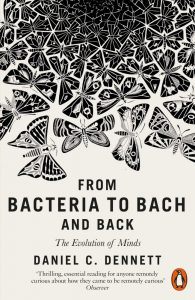Eric Schliesser in Digressions & Impressions:
 Despite Dennett’s training in philosophy (at Oxford, no less, under Ryle), his appointment in a well-regarded philosophy department, and his continued self-identification as a philosopher (“Philosophers, like me” (407)), I suspect that many professional philosophers find Dennett’s From Bacteria to Bach and Back, if they read it all with any care, barely philosophy. Dennett offers few structured arguments (with carefully numbered premises), no clear dilemmas/trillemas (etc.) nor the apparent paradoxes that are the staple of our profession nor does he deploy the conceptual distinctions that populate, say, recent philosophy of mind. With a few notable exceptions (Peter Godfrey Smith, Ruth Millikan, Dan Sperber, Bryce Huebner, Jody Azzouni, etc.) Dennett rarely mentions other living philosophers whose work he draws upon.
Despite Dennett’s training in philosophy (at Oxford, no less, under Ryle), his appointment in a well-regarded philosophy department, and his continued self-identification as a philosopher (“Philosophers, like me” (407)), I suspect that many professional philosophers find Dennett’s From Bacteria to Bach and Back, if they read it all with any care, barely philosophy. Dennett offers few structured arguments (with carefully numbered premises), no clear dilemmas/trillemas (etc.) nor the apparent paradoxes that are the staple of our profession nor does he deploy the conceptual distinctions that populate, say, recent philosophy of mind. With a few notable exceptions (Peter Godfrey Smith, Ruth Millikan, Dan Sperber, Bryce Huebner, Jody Azzouni, etc.) Dennett rarely mentions other living philosophers whose work he draws upon.
In some respects Dennett is a legacy philosopher, our intellectual celebrity in the world of public intellectuals, admired or reviled (due to his association with New Atheism). One can easily imagine that Dennett’s latest work shares the fate of Rorty’s late work: mainstream professional philosophers recognizing the name, and paying respectful lip-service to his importance while ceding engagement with his ideas to other disciplines and TED audiences. This would be a mistake. Dennett’s late work is brimming with new ideas (developed in more scholarly publications for over a decade) and insightful changes of heart. (Some other time I offer examples; but recall here.) Along the way, Dennett has become an exemplar for an entirely different way of doing philosophy. I call this (recall here and here): synthetic philosophy.
More here.
